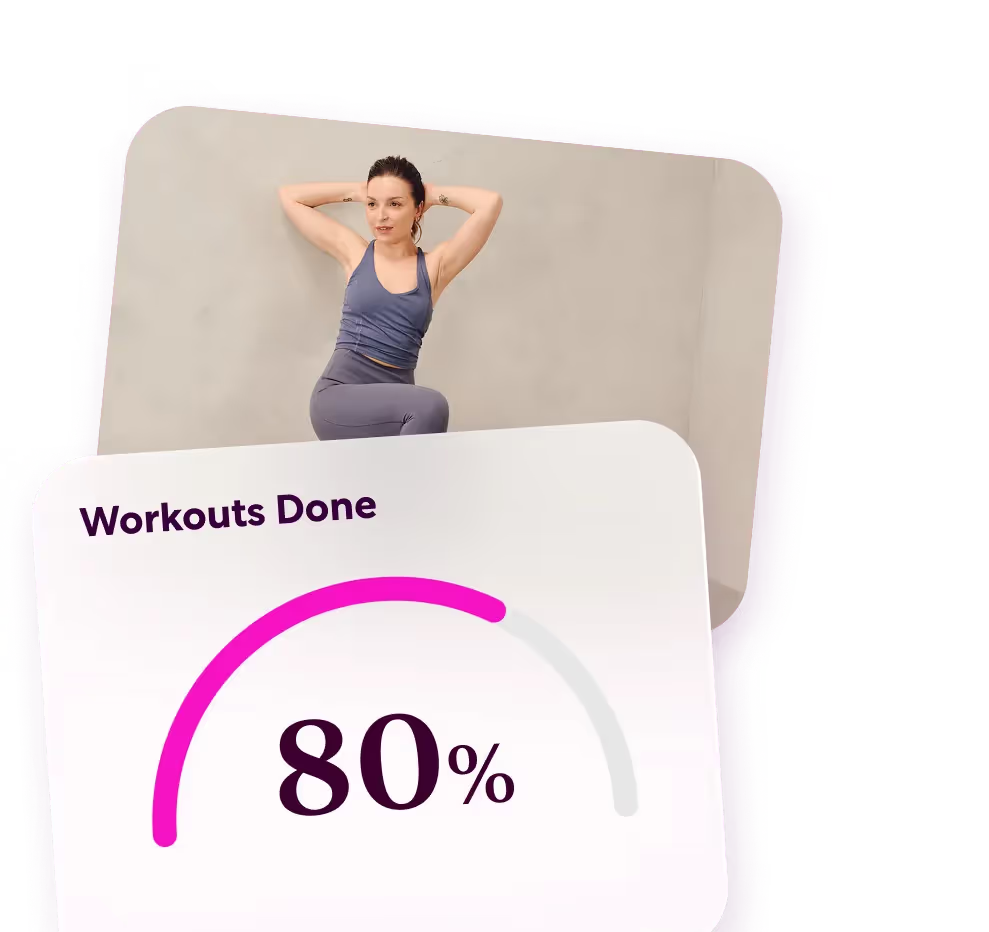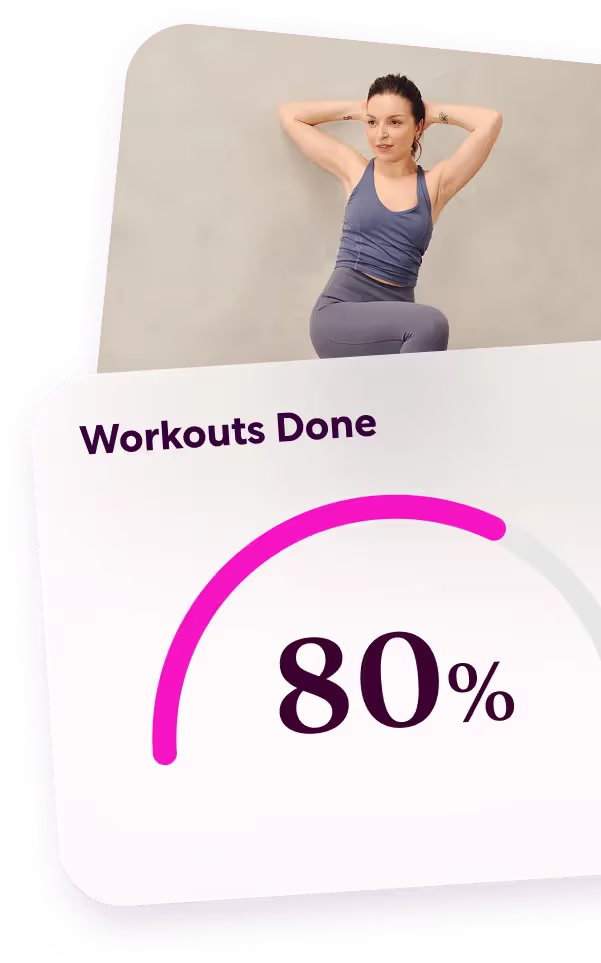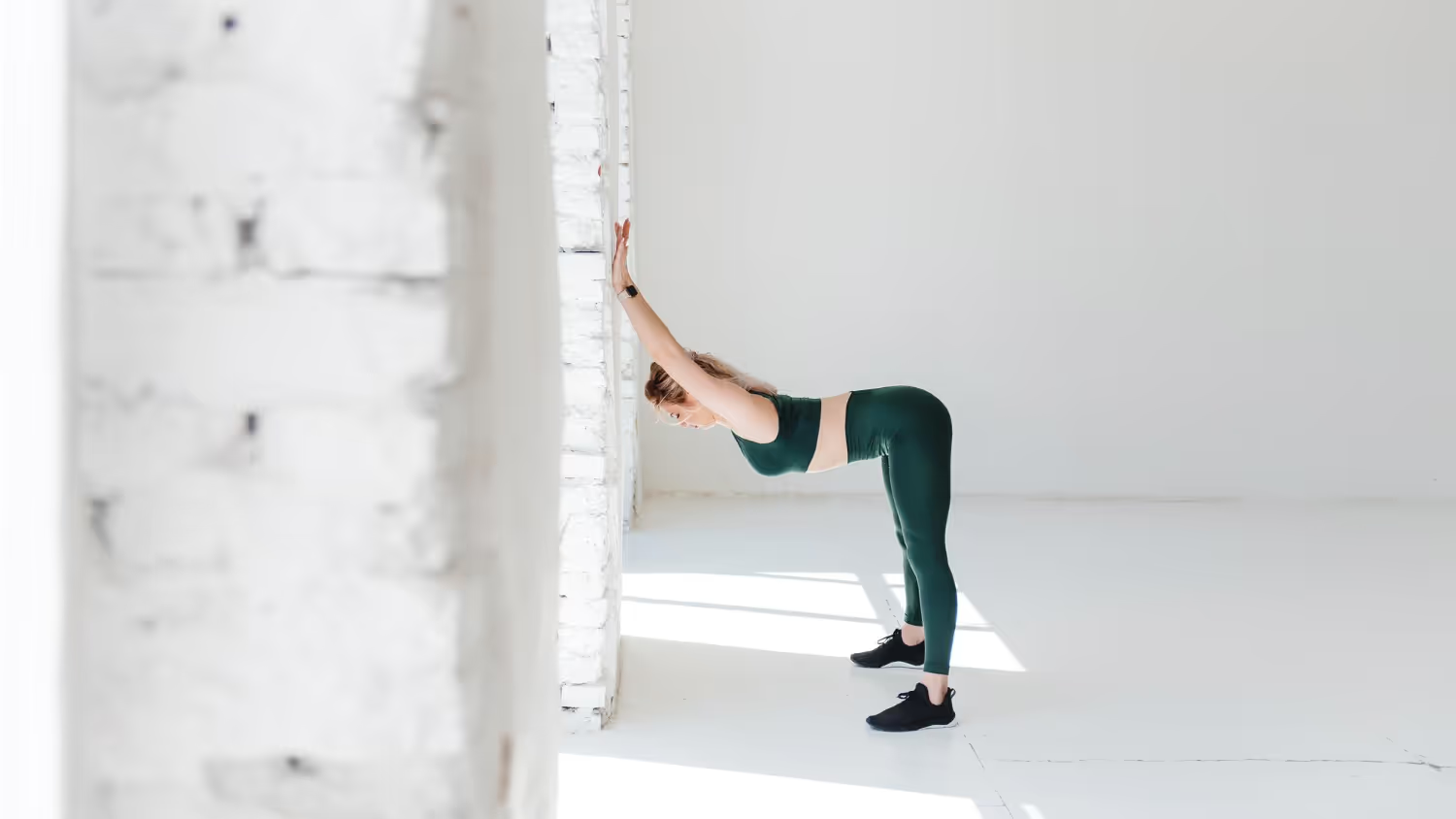15 mins Pilates on your terms – anytime, anywhere.
Get your plan
15 mins Pilates on your terms – anytime, anywhere.
Get your plan
Which app offers better workout options?BetterMe vs Reverse Health: Which Program is Right for You?
Alright, let’s get one thing straight right off the bat—this is a totally unbiased review from our expert writers. We’re just here to help you figure out which program suits you best, no strings attached, we have put to the test both apps. So, grab a coffee (or a green smoothie if you're feeling fancy), and let’s dive in!
Health and fitness apps have become essential tools for improving users' wellness journeys. Two notable contenders in this space are BetterMe and Reverse Health, each offering unique approaches to helping users achieve their health goals.
But while these popular wellness apps promise amazing results, they work differently. Today, we’ll explore every aspect of each program to help you choose the perfect match.
Overview of BetterMe and Reverse Health

What Is BetterMe?
BetterMe started as a simple workout app in 2016. Now, millions of people use this all-in-one platform for exercise, meal planning, and mental wellness. The app focuses on making healthy habits stick through personalized guidance and daily check-ins.
Users start their journey with a detailed quiz about their current habits, goals and limitations. Based on these answers, BetterMe creates custom plans that match each person's unique situation.
What Is Reverse Health?
Reverse Health takes a unique approach to women’s health, focusing on hormone balance and metabolism with programs developed by a team of experts, including doctors and nutritionists, who create custom plans based on blood work, body type, and other personal information.
The app offers a variety of specialized programs, including:
Catering to different needs and preferences. At its core, Reverse Health emphasizes metabolic health and hormone balance, combining nutritional science with behavior psychology to create lasting changes.
Key Features and Benefits
Fitness and Exercise Options
BetterMe provides numerous workout choices for different fitness levels, giving users access to guided video workouts ranging from beginner-friendly exercises to advanced routines. The app includes bodyweight workouts, yoga sessions, and high-intensity interval training. Every exercise comes with clear demonstrations and verbal instructions.
Reverse Health takes an alternative path toward physical activity with a special focus on being helpful but really safe for the user, their main public are women over 40 years old. Structured workouts aren’t as much of a focus. Instead, it encourages natural movement. The program suggests a less traditional approach that involves walking, stretching, and strength training, making it less intimidating for beginners.
Nutrition and Meal Planning Tools
BetterMe offers extensive meal planning features, with users receiving personalized meal suggestions based on their dietary preferences and goals. It has a recipe database with step-by-step cooking instructions and a meal tracker for nutrient and portion monitoring.
In comparison, Reverse Health emphasizes metabolic-friendly eating patterns, eschewing common advise like eliminating certain foods from your diet. Instead, the program encourages users to learn about proper food timing and combinations that support hormonal balance. The focus is less on strict meal plans and creating sustainable eating habits by understanding the effect of different foods on your body.
Personalization and Customization Features
BetterMe adapts programs based on user feedback and progress, modifying workout intensity and meal suggestions based on user reports. It lets users customize exercise schedules and swap meals that don’t match their tastes.
Reverse Health personalizes recommendations through continuous data collection. The program tracks various health markers beyond weight, including the quality of your sleep, your energy levels throughout the day, and so on. This comprehensive monitoring helps create highly individualized wellness strategies.
Mindset and Habit-Building Support
Aside from the physical aspect, BetterMe includes psychological support, complete with daily motivational messages to encourage users to stay consistent. The app tracks streaks and celebrates small wins, with occasional tips for users to manage stress and unhealthy snacking habits driven by stress.
Reverse Health focuses on behavioral change. The program teaches mindfulness techniques and stress management strategies. Their approach addresses underlying habits that affect wellness outcomes and health goals.
Comparing Target Audiences

Both BetterMe and Reverse Health have gained significant traction among health-conscious individuals, but their methodologies, features, and target audiences differ.
Who Is BetterMe Best Suited For?
BetterMe works great for beginners and intermediate fitness fans for all ages. The app helps busy people who need structure but want flexibility. It comes with step-by-step exercise instructions and meal plans, helping out folks who enjoy tracking progress through numbers and measurements. You'll find workouts ranging from 10 to 45 minutes, plus meal ideas that work with different cooking skills.
The platform is particularly appealing to visual learners who will appreciate the video demonstrations. Added motivation and accountable also come from the community support provided by BetterMe’s social features.
Who Benefits Most from Reverse Health?
Reverse Health targets women over 35 who struggle with weight loss and hormone issues. Their program speaks to folks who tried other diets without success. The focus stays on fixing underlying health problems rather than quick fixes, which is useful if you want to understand the science behind how you respond to changes, especially during your menopausal years.
Pricing and Value

Subscription Costs for BetterMe
BetterMe offers several subscription options. Monthly plans start around $20 with a free three-day trial. The six-month subscription provides better value at $41.99 with an extended seven-day free trial. For the best value, you can subscribe annually. The app sometimes runs special promotions for new users. Family plans also let multiple household members access premium features at a lower price.
Subscription Costs for Reverse Health
Reverse Health provide membership tiers with different features starting at $2.65 a week. Premium subscriptions include additional coaching support. The program occasionally offers seasonal discounts and promotional rates.
Value for Money: What You Get with Each Program
BetterMe is praised for its user-friendly design and comprehensive fitness and nutrition tools. The clean interface makes finding features super easy. Workout videos load quickly and stream smoothly; recipe instructions stay clear and straightforward.
Reverse Health focuses less on flashy design but delivers solid expert reviewed content, from meal plans to expert-vetted advice. The app explains complex health concepts through simple videos and graphics. It also gives users access to detailed progress reports and explanations of lab results. Higher-tier subscriptions include one-on-one coaching sessions.
Overall, BetterMe is the more budget-friendly, feature-filled option. However, Reverse Health is best for those who prefer direct access to real-time experts, including nutrition and fitness professionals
User Experiences and Reviews comparison

Positive Feedback on BetterMe
Many users praise BetterMe for helping them progress significantly towards their fitness goals. The workout variety prevents fitness plateaus, while the clear instructions and modified exercise options are helpful for beginners.
BetterMe has a 4.5 rating out of 5 on the App Store across 73.9K ratings.
Positive Feedback on Reverse Health
Reverse Health’s emphasis on lifestyle changes often results in increased energy levels, improved sleep quality, and a better understanding of why certain changes matter, creating a more sustainable approach to weight management and better overall health. Many users report feeling more confident about their healthy habits thanks to the program’s educational components.
Reverse Health has a 4.4 rating out of 5 on the App Store across 4.4K ratings.
Common Complaints and Limitations of Each Program
The chief complaint about BetterMe is its lack of personalized nutrition guidance and advanced exercise options. Meanwhile, Reverse Health’s slower approach is a common issue. It isn’t unusual for users to find themselves overwhelmed by the scientific information provided by Reverse Health. Finally, the higher price point presents a barrier for some potential users.
How to Choose the Right Program for Your Goals
In a nutshell, BetterMe is best for those who:
- Seek a comprehensive approach to health and wellness
- Want structured workout plans with varying intensity levels
- Need guidance with meal planning and nutrition
- Value mental health support alongside physical fitness
- Prefer a more traditional approach to weight management and fitness
On the other hand, Reverse Health has a more specialized focus that’s particularly suited for:
- Individuals interested in understanding their metabolic health
- Women dealing with hormonal imbalances
- Those who have struggled with traditional diet and exercise programs
- People seeking a science-based approach to weight management
- Users interested in learning about the connection between hormones and health
Considering Your Fitness and Nutrition Needs
Think about your current activity level and exercise experience. Consider whether you prefer structured workouts or flexible movement options. You may also want to reflect on your past attempts at lifestyle changes and what worked best and what didn’t. Finally, don’t forget about your schedule, daily routine, and availability.
Assessing Your Budget and Commitment Level
Compare program costs against your monthly budget, including the associated costs of the lifestyle changes you’ll have to make to follow the recommended programs. Think about how much time you can dedicate to health improvements and what they require from you. Remember that lasting changes require consistent effort regardless of program choice.
Exploring Trial Options or Free Versions
Both programs offer trial periods for new users. Take this time to test basic features while reading detailed reviews from long-term users. Don’t be afraid to contact customer support if you have specific questions about each program.
Recap: BetterMe vs Reverse Health – Which One Should You Choose?
Both BetterMe and Reverse Health can help you reach your health and fitness goals, but they work differently. BetterMe suits people who want to make healthy living more accessible and fun. Reverse Health is best for folks dealing with specific health challenges. Their medical approach costs more, but they provide specialized support for complex situations, which is particularly useful for older women.
Remember, your choice depends on personal factors such as your current health situation, available budget for wellness, preferred learning style, time commitment level, and need for professional guidance.
15 mins Pilates on your terms – anytime, anywhere.
Get your plan
Sources
FAQs
Which app offers better workout options?
BetterMe offers a variety of structured video workouts for different fitness levels, while Reverse Health focuses on low-impact activities like yoga and Pilates.
Can these apps help improve overall fitness?
Both apps are designed to support fitness goals, with BetterMe offering traditional exercise plans and Reverse Health focusing on sustainable movement.
Are the workouts customizable?
Both apps allow customization: BetterMe lets you adjust workout intensity and schedules, while Reverse Health tailors activity recommendations to your needs.
Which app is better for building a fitness routine?
BetterMe suits those seeking a structured routine with guided exercises, while Reverse Health is ideal for integrating movement into daily life.
Do the apps include strength or cardio exercises?
BetterMe includes strength, cardio, and HIIT workouts, while Reverse Health focuses on yoga, Pilates, and gentle strength training.







